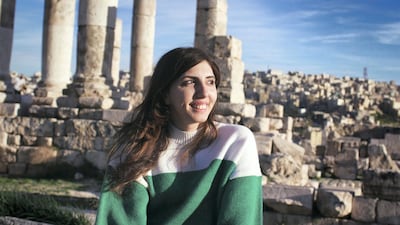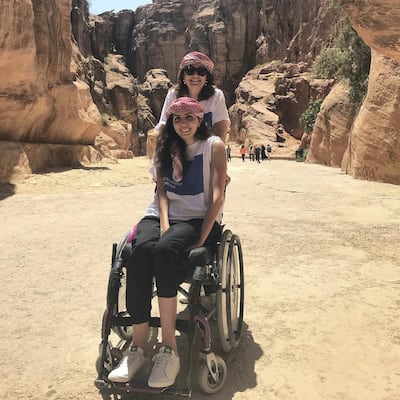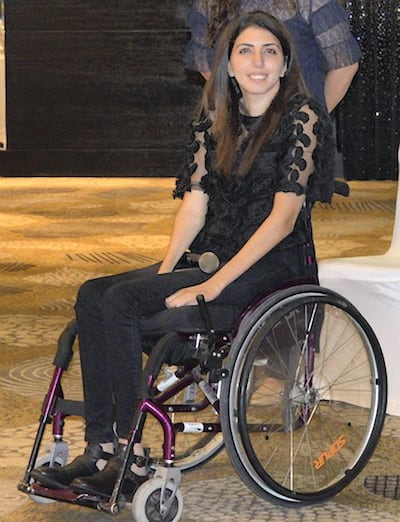When Aya Aghabi suffered a spinal cord injury in a car accident when she was 18 years old, leaving her wheelchair-bound, everyone assumed she would have to give up her dreams of studying abroad and of making a living.
She proved them wrong. One year after her accident, she went on to pursue an undergraduate degree in international development at the University of California, Berkeley. In the decade after she graduated, this young activist went on to achieve a remarkable amount in her short life, with a focus on advocating for accessibility in public spaces through the platform she launched in her home country, Accessible Jordan. Her death last month from a rare lung infection, at the age of 28, has come as a terrible shock, not just to those of us in Jordan whose lives were impacted by her spirit, sense of humour and advocacy but to many who did not know her directly yet feel the impact of her loss. There has been a widespread outpouring of love and support for Aya, with multiple organisations and dignitaries honouring her indelible impact in the community.
Among the deluge of condolences have been tributes from Jordanian Prime Minister Omar Razzaz, Queen Rania of Jordan and Hussein bin Abdullah, the Crown Prince of Jordan, who expressed their sadness at her death. The staff and superintendent of the high school she attended in Riyadh, Saudi Arabia, flew into Jordan to attend her funeral. There have been heartfelt tributes from people from all walks of life, who were touched in some way by her work.
Aya was ambitious but modest. Always ready to share a laugh, she had the kind of smile that reached her eyes, sometimes mischievous but always sincere. Among her many qualities was her unassuming strength and quiet resilience. In retrospect, it was this defining characteristic that started an unprecedented movement and spearheaded a nation in seeking greater accessibility.
After graduating in the US, Aya chose to return to her home country to apply her knowledge and effect change. Just as people thought that she would not be able to pursue her studies after her accident, they doubted that she could return and make a living in the Middle East. But that was exactly why Aya returned and in so doing, she proved them wrong for a second time.
The idea for Accessible Jordan was born when Aya first began to share her own experiences of navigating public spaces across the country to help other people with accessibility issues. “Every time I wanted to go out in Amman, it became a hassle to try to find a place that was accessible and I would have to call [ahead] to ask if they had stairs, ramps or elevators,” she said last year. “In California, I found it much easier to navigate the city because all the information about accessibility was easily found online. I decided to start this website to make it easier and faster to find places that were easy to access in Jordan.”
As a lover of eating out and social events, Aya started by contacting some of her favourite restaurants, encouraging them to build custom-made ramps. Over time, as her campaign grew, other private businesses and banks began to contact her, asking for her help in creating accessible storefronts and entrances.
Aya’s joie de vivre was demonstrated in this labour of love. She was emphatic that her advocacy wasn’t just for people in wheelchairs but for parents with pushchairs, the elderly and those with mobility issues. She campaigned tirelessly for accessibility to places that impacted daily life, from healthcare clinics to bank branches. These victories were compiled in an online and easily searchable national database, the first of its kind. Aya was a universalist; she did not just want to help others like her but to offer a civic service for all members of society.
Following in the footsteps of her proud Jordanian parents and her late father’s career in tourism, Aya took a special interest in heritage and visitor sites. Her love for her country was demonstrated in the way she fought to make accessible its wonders. She collaborated with different governmental and non-governmental initiatives to persuade the Ministry of Tourism and Antiquities to promote accessible tourism in Petra. This served tourists from across the globe, many of whom personally contacted Aya for travel and accessibility advice for Jordan. This year, Jordan Inbound Tour Operators Association announced it would make accessible tourism a main goal as a result of her persistence.
Thanks to her work ethic, and the ease and pleasure of working with her, she fostered deep professional relationships with all who dealt with her. Her work was personally endorsed by multiple high-ranking United Nations and international officials, including the staff of the British embassy in Jordan, whose offices she had helped make accessible and where she had met Prince William, the Duke of Cambridge. Unesco and the European Union’s Net-Med Youth programme funded Accessible Jordan and flew her to present her achievements at a conference in Brussels last year. She also helped the Higher Council for the Rights of Persons with Disabilities in Jordan launch a national plan to revamp at least 60 per cent of all public facilities by 2029. Another project that embodied her spirit was her collaboration with the Bahja Initiative to introduce Jordan’s first wheelchair-accessible swings, which continue to make the joy of play possible for children with special needs.
Aya believed that through accessibility, she could transform society, and that human mobility was a right for all and would lead to a more equitable and inclusive society. Through educational visits to schools and universities, she began to see the formation of student groups raising awareness about accessibility issues and inclusive classrooms, advancing the conversation she had started. She worked tirelessly but made it look easy, so it is easy to forget that just a few years ago, she was hesitant to speak publicly. Before she juggled multiple jobs, started her own organisation and hired a team, she had to fight for a place at the table.
Despite all that she achieved, as her friend, I know there was so much more that she wanted to accomplish. Just two months ago, Aya was accepted as a fully funded graduate student at a prestigious university in the UK. It is painful to imagine all the life plans and goals that she had set herself to make this world immensely better but it is in the small, daily acts of kindness that we will miss her most. We will remember her grace and courage in defying social norms for the greater good and the way she not only fought to beat obstacles in her path but battled for every victory.
Her work will live on. Aya has managed to leave behind a blueprint of her vision in the changing physical infrastructure of the country, and in a nation’s awareness that with societal inclusion comes a more representative, happy, thriving nation. There are not many leaders who have been able to achieve what Aya did in 28 years. We owe it to her to keep not only her memory but her life’s work alive.
Reem Farah is a graduate in migration, mobility and development studies and previously worked as research co-ordinator at Visualising Impact data science firm



